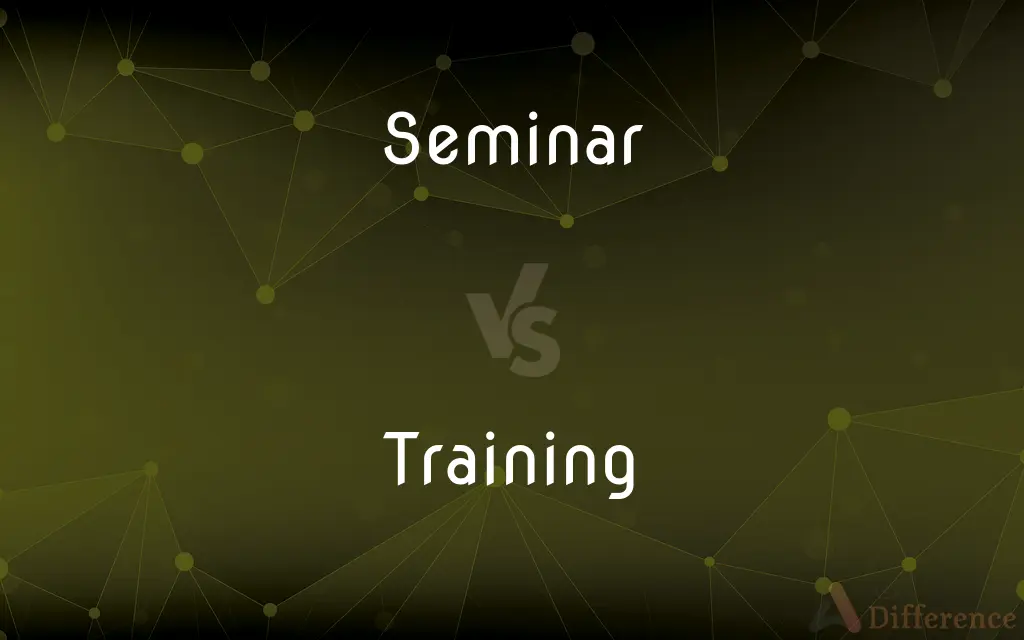Seminar vs. Training — What's the Difference?
Edited by Tayyaba Rehman — By Maham Liaqat — Updated on February 24, 2024
A seminar focuses on academic or professional discussions led by experts, emphasizing knowledge sharing, while training is a hands-on, skill-based learning process aimed at enhancing specific abilities.

Difference Between Seminar and Training
Table of Contents
ADVERTISEMENT
Key Differences
Seminars are typically more theoretical, involving lectures, presentations, and discussions led by one or more experts on a particular topic. They aim to disseminate knowledge and provoke thought among participants. Training, on the other hand, is practical and skill-oriented, designed to teach participants how to perform specific tasks or improve their proficiency in a certain area.
Seminars often encourage the exchange of ideas among participants and experts, fostering a collaborative learning environment, whereas training sessions usually focus on individual skill development, with trainers providing step-by-step guidance and feedback.
Seminars are common in academic and professional contexts where the goal is to explore new theories, discuss research findings, or delve into complex subjects. In contrast, training is prevalent in workplaces and vocational education, where the emphasis is on acquiring or enhancing job-related skills.
The success of a seminar is often measured by the engagement and intellectual stimulation of the attendees, whereas the effectiveness of training is usually assessed through practical tests, the demonstration of acquired skills, or improvements in work performance.
Comparison Chart
Focus
Theoretical knowledge
Practical skills
ADVERTISEMENT
Format
Lectures, discussions
Hands-on practice
Goal
Knowledge sharing, discussion
Skill acquisition, proficiency improvement
Assessment
Participation, engagement
Skill demonstration, tests
Setting
Academic, professional conferences
Workplace, vocational schools
Compare with Definitions
Seminar
A gathering for discussing a specific academic or professional topic.
The university held a seminar on renewable energy solutions.
Training
A program designed to enhance specific skills or knowledge.
The company offers training in customer service excellence.
Seminar
An educational meeting with expert lectures and participant discussions.
She attended a seminar on digital marketing trends.
Training
Hands-on sessions focused on practical skill application.
The first-aid training involved a lot of practical exercises.
Seminar
A session designed for knowledge exchange among experts and attendees.
The seminar on ancient history sparked lively debates.
Training
Instructional courses aimed at professional or personal development.
She took a training course in web development.
Seminar
A platform for presenting research findings and theoretical concepts.
He presented his thesis at the graduate seminar.
Training
A learning process involving practice and feedback.
The apprenticeship included on-the-job training.
Seminar
An event that facilitates networking and collaboration in a field.
The industry seminar was a great place for professionals to connect.
Training
Activities aimed at improving efficiency and performance.
The athletes undergo rigorous training before the season starts.
Seminar
A meeting for an exchange of ideas; a conference.
Training
Present participle of train
Seminar
A class held for advanced studies in which students meet regularly to discuss original research, under the guidance of a professor.
Training
The activity of imparting and acquiring skills.
Seminar
A course offered for a small group of advanced students
Training
The result of good upbringing (especially knowledge of correct social behavior);
A woman of breeding and refinement
Seminar
A seminar is a form of academic instruction, either at an academic institution or offered by a commercial or professional organization. It has the function of bringing together small groups for recurring meetings, focusing each time on some particular subject, in which everyone present is requested to participate.
Training
Training is teaching, or developing in oneself or others, any skills and knowledge or fitness that relate to specific useful competencies. Training has specific goals of improving one's capability, capacity, productivity and performance.
Seminar
A course of study for a small group of students in a college or graduate school, often entailing research under the guidance of a professor.
Training
The process or routine of one who trains.
Seminar
A meeting held for the exchange of useful information by members of a common business community.
Training
The state of being trained.
Seminar
Any meeting for an exchange of ideas
Training
The act of one who trains; the act or process of exercising, disciplining, etc.; education.
Training
Activity leading to skilled behavior
Common Curiosities
How do participants benefit from seminars?
They gain insights, learn about new developments, and engage in intellectual discussions.
What distinguishes training from seminars?
Training focuses on practical skills and hands-on learning, while seminars are more about theoretical discussions.
Can seminars involve interactive activities?
Yes, seminars can include interactive discussions, Q&A sessions, and group activities.
Are training sessions only for vocational skills?
No, training can also cover soft skills, such as leadership and communication.
What is the main goal of a seminar?
To share knowledge, discuss ideas, and provoke thought on specific topics.
Can seminars be held online?
Yes, seminars can be conducted virtually through webinars and online platforms.
Do seminars offer certifications?
Not typically, as they're more focused on discussion than on formal skill assessment.
Is feedback a part of training sessions?
Yes, trainers often provide feedback to help participants improve their skills.
What makes training effective?
A combination of practical exercises, expert guidance, and relevant feedback.
How are training needs identified?
Through skill gap analyses, performance reviews, or individual development plans.
Is prior knowledge required for attending seminars?
Some seminars might require foundational knowledge, while others are introductory.
Can training lead to certifications?
Yes, many training programs conclude with a certification upon successful completion.
Is on-the-job training a form of training?
Yes, it's a practical approach where employees learn by doing tasks under supervision.
Can seminars contribute to professional development?
Absolutely, they offer valuable insights and networking opportunities.
Are workshops and seminars the same?
Workshops are more interactive and hands-on than seminars, which are discussion-based.
Share Your Discovery

Previous Comparison
Cliff vs. Mountain
Next Comparison
Sob vs. SoeAuthor Spotlight
Written by
Maham LiaqatEdited by
Tayyaba RehmanTayyaba Rehman is a distinguished writer, currently serving as a primary contributor to askdifference.com. As a researcher in semantics and etymology, Tayyaba's passion for the complexity of languages and their distinctions has found a perfect home on the platform. Tayyaba delves into the intricacies of language, distinguishing between commonly confused words and phrases, thereby providing clarity for readers worldwide.















































